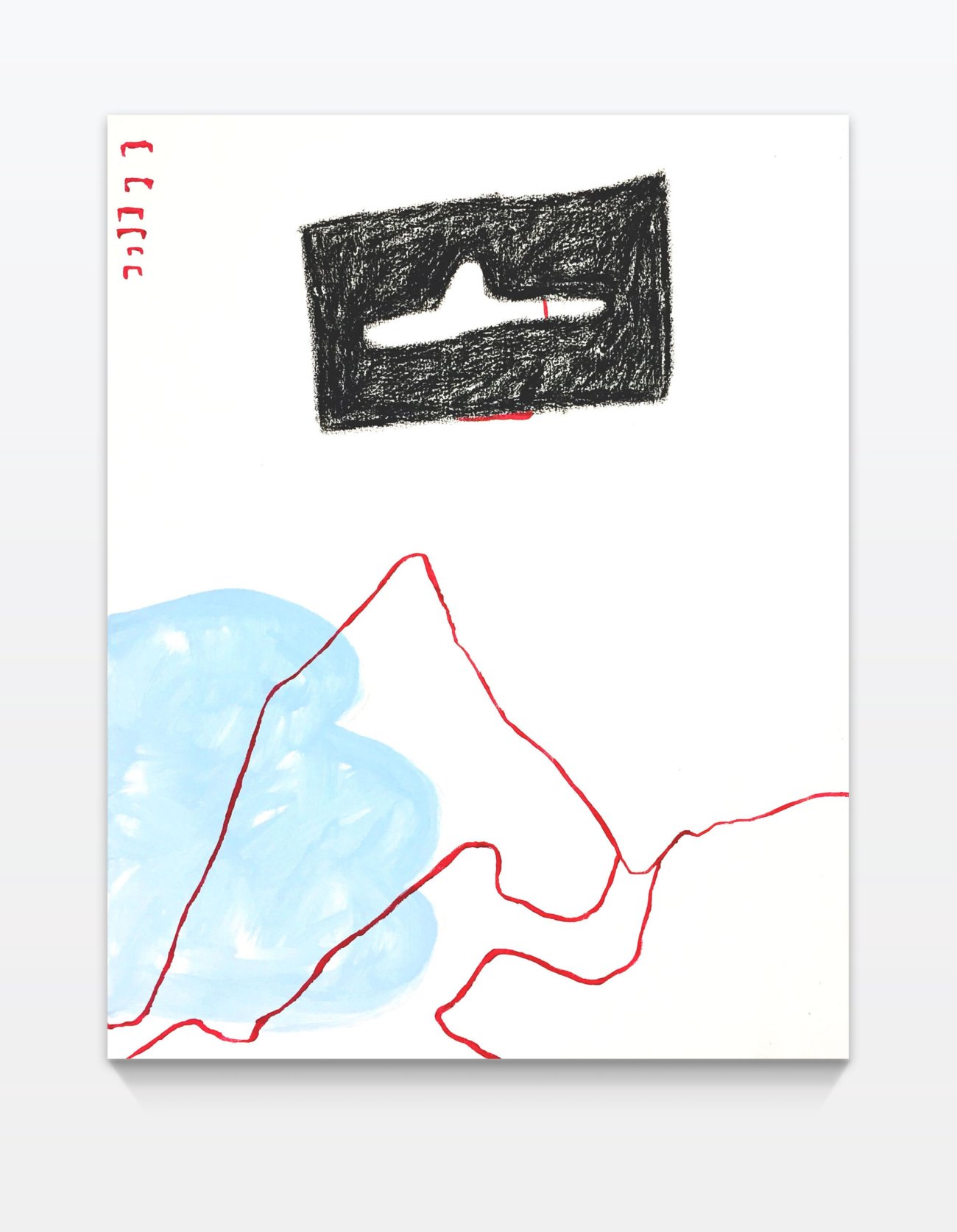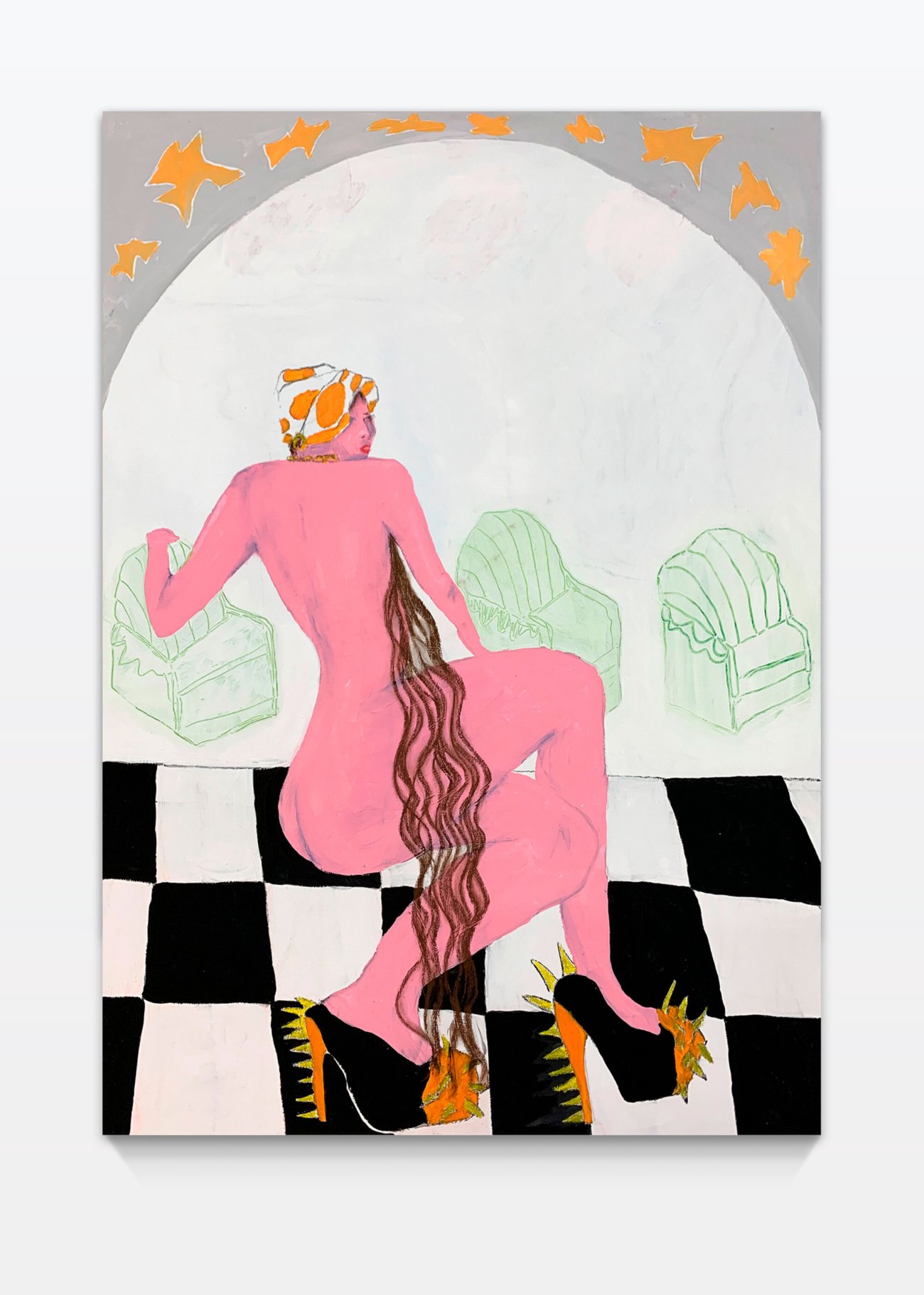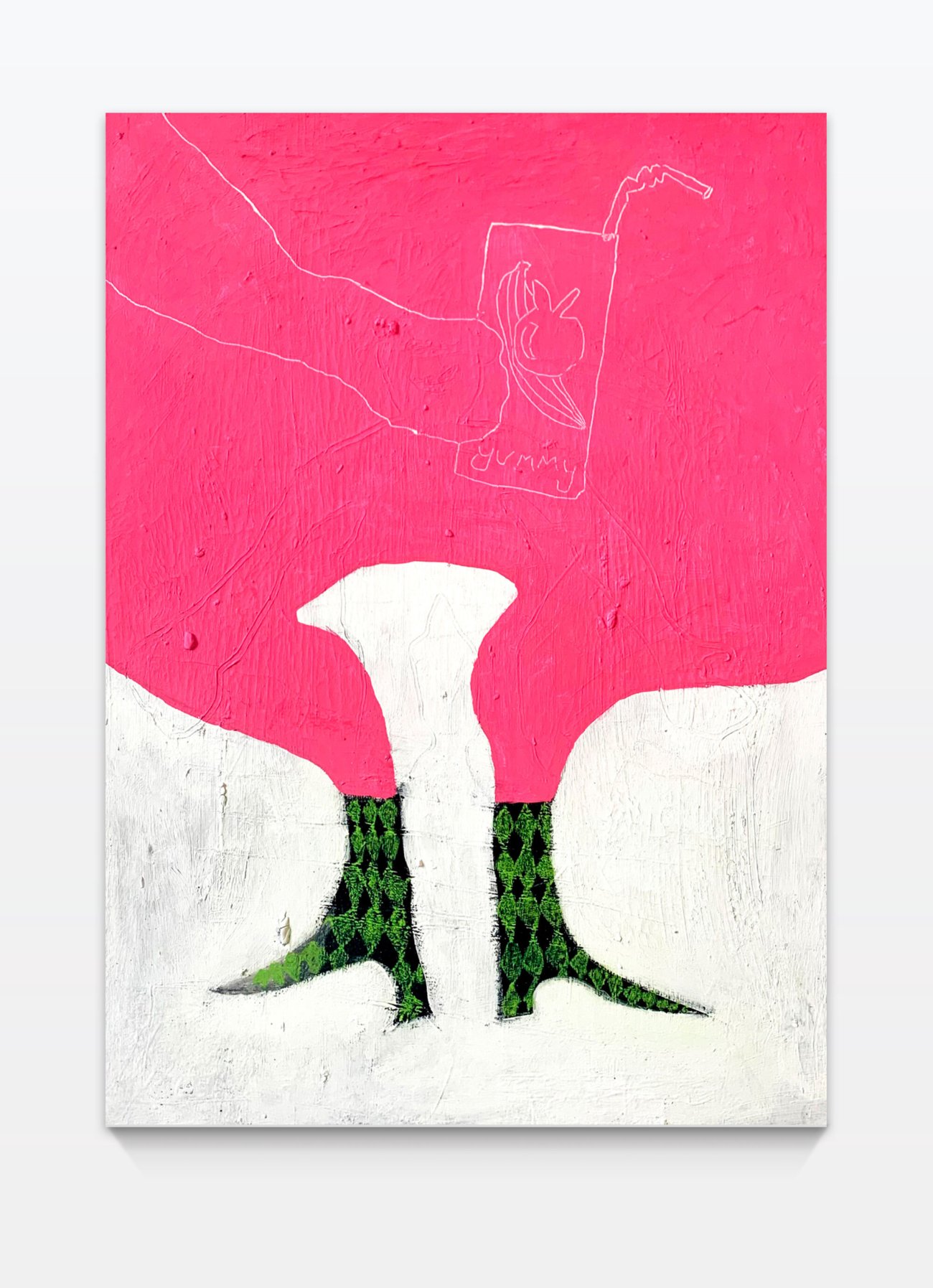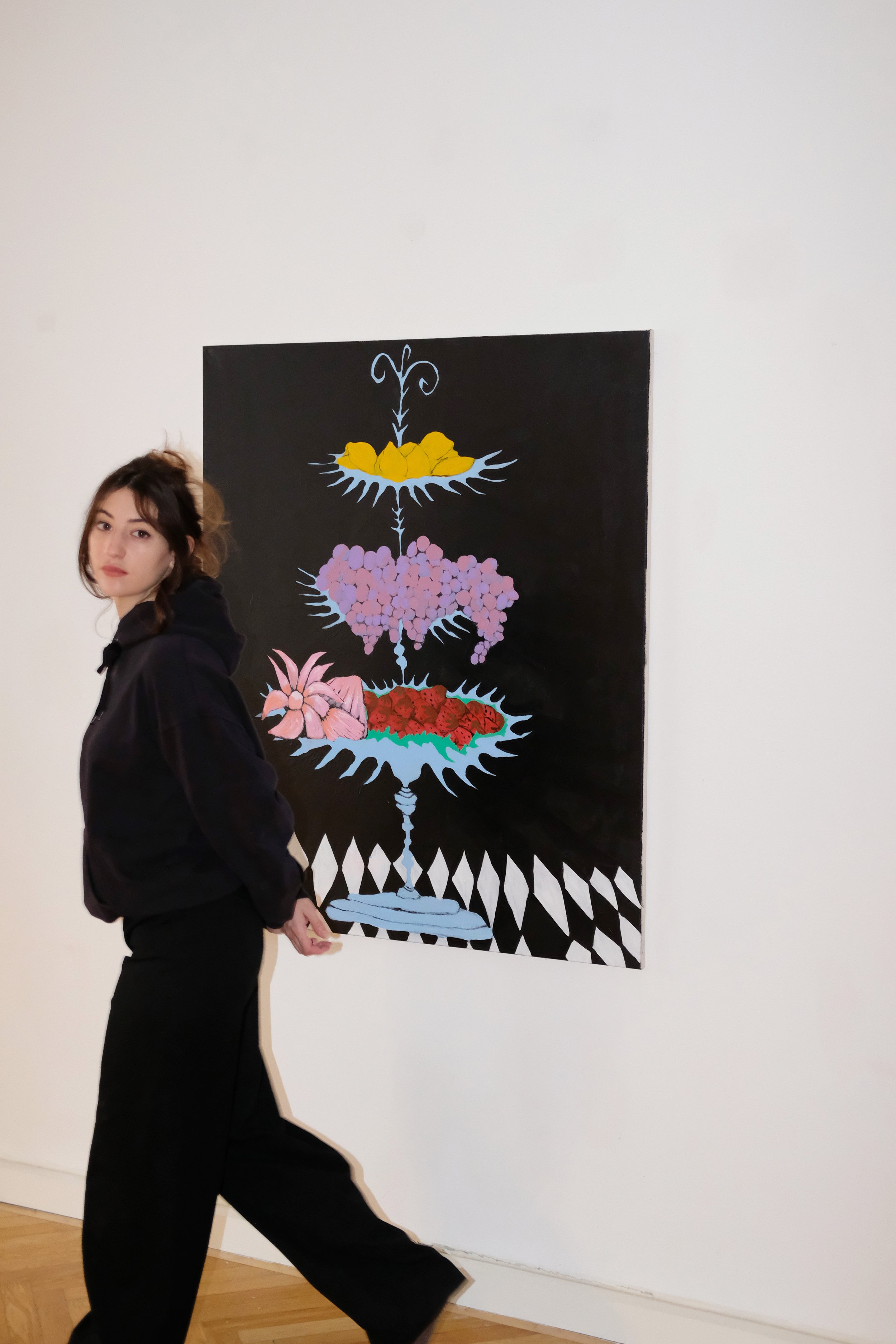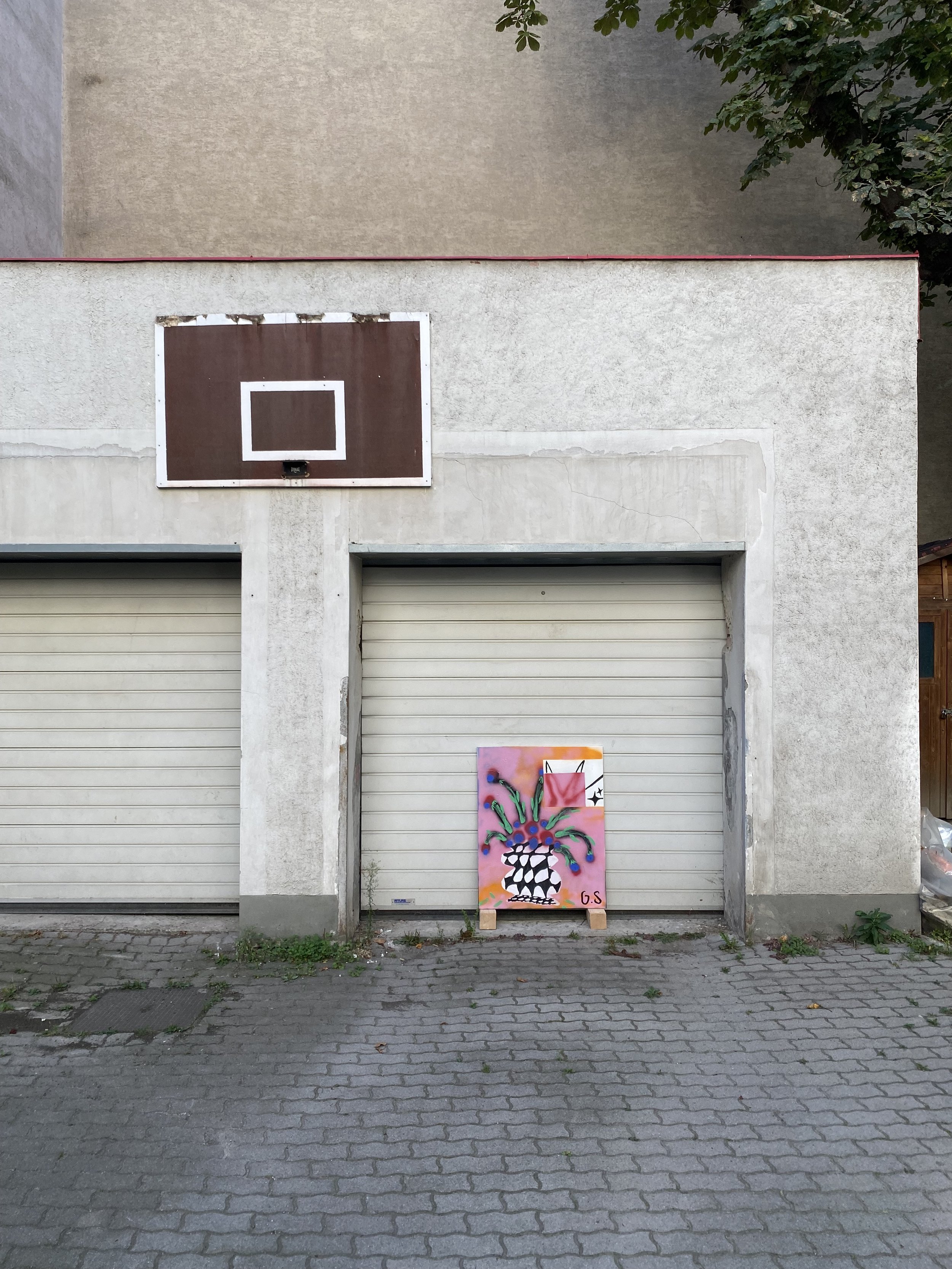Gemma Solà Sotos
“Making decisions in painting is fun, challenging, frustrating, exciting and impredictable and sometimes it feels like playing chess against myself.”
Gemma Solà Sotos was born 1993 in Barcelona. After studying Fine Arts at the University of Barcelona she decided to move to Germany and later to Austria. She currently lives and works between Vienna and Munich and studies painting at the Academy of Fine Arts Munich in the Class of Prof. Gregor Hildebrandt. Gemma often paints supposedly trivial everyday objects and motifs, and imbues them with great sensitivity and a certain fragility that trigger feelings that are difficult to describe, but definitely touch you and stuck in your head and stomach. Somewhere between nostalgia and humor, her works create a space where you certainly like to be if you love painting. In our interview we talked about learning to deal with uncertainties in life and also in the painting process, about influences and sources of inspiration, about changes of place and their consequences, self-organization and sticking to routines. And we found out that Gemma's German is much better than my Spanish.
Hi Gemma, first of all: happy new year! I have a good feeling, I think 2023 will be great. How were your first days in the new year? For me mainly sleeping and eating, haha.
Hi Malte - thank you very much, happy new year to you too! My start into 2023 was good. Mainly trying to put in practice some proposals, like organisation, structure and self care. Besides that, I relate with the eating part haha.
Last year was tough, though. The situation of the world is very fragile and there are countless crises: The war in Eastern Europe, energy crisis, the suppression of women’s rights and freedom by the terrible regime in Iran, inflation and a pandemic that’s still not really over yet. To what extent do you think this kind of „overall insecurity“ has an influence on your work as an artist today?
I think the words you mentioned are pretty accurate to describe it: fragility, insecurity, anger, frustration and nostalgia are feelings I'm comfronted with quite often. And this affects as well on my regularity working. Sometimes I have periods of time where I work a lot and others where not so much, where maybe I feel drained or unmotivated. This is something I am trying to work on though, related to what I meant now with the organisation and structure. I am quite unstructured and sometimes I work during the day, sometimes during the night, and my emotions play a big role on how I approach the canvas. I'm trying to stick more to plans and routines so I can have more control over it.
From the worrying present situation briefly back to your beginnings: Gemma, please tell me a little bit about your background. How did it all start with art, how did you come to painting?
I guess art was there since the very beginning. I tried plenty of activities and sports as a kid, but I would always lose interest very fast. I remember Art Attack was something I was always very excited about and ready to put my hands on. I don't know if you had something like this in Germany, but it was a very popular arts and crafts show for kids in the 90s in Spain. I was always crafting, building and painting those things at home while watching the videos. So looking back, art has always been present in my life in a way, but it never became serious until I moved to Randers, a very small town in Denmark, after I finished highschool. I started a career there that had nothing to do with art and I realized after pretty much a week that that was not for me. I knew nobody there and I felt like fish out of water. The only thing I did was drawing and painting day and night. I remember that time as a hard one to be honest, but it also sorted out many things and gave me the strenght to take decisions and move forward.
I can understand that, I think sometimes a change of place helps you to see more clearly where you actually want to go in life.
After few months I decided to go back to Barcelona and start the Fine Arts Bachelor at Universitat de Barcelona. Back then painting was not specially my focus. The studies in the UB in Fine Arts are different than in Germany - they're structured in 4 years, where in the first 2 is mandatory to do a little bit of everything (video, sculpture, drawing, etching, painting, performance, photography, etc as well as theoretical lessons like art history, art critique...) and from the 3rd year on it's like hybrid, you have mandatory ones and a few subjects of your choice. In a way it was very nice to have a little taste of several disciplines, but when I finished I realized I didn't really have the time to go deep into something, nor develop my own language. In my last year I did an Erasmus in the AdBK München and that was pretty revealing. I had the time, space and freedom to just figure out what I wanted to do, and do it. Also something that was very important as well was my classmates and the community feeling of the class, and having Gregor as a professor. Back in the UB you don't belong to one same class and you don't have one professor neither, it's something in constant change.
So, did that make you decide to move from Spain to Germany?
Yes, this experience was basically the reason why I decided to move to Munich. After the Erasmus I came back to Barcelona, did my final bachelor work and applied to the AdBK, in the class of Gregor Hildebrandt. I just realized that was exactly what I needed and wanted after my bachelor. Precisely because I had the background - or the tools - but no idea of what it meant to develop my own work and to deal with an ongoing creative process. Munich was also back then a super inmersive experience, where my days and nights would be in the atelier in the Akademie, painting, having nice chats with colleagues, and partying. Going to plenty of exhibitions and getting to know different artists. I remember this time as specially enriching and shaping for my work. And that was something I couldn't have done in my hometown.
Today you live in Vienna, but you still study in Munich right?
Yes, exactly. Covid had a very big impact on that. The Academy was closed for quite a long time and I had to find alternatives to work that were not so easy. Munich is a very beautiful city but it's also hard for students, specially art students. It was also difficult being a foreigner in the sense of not having a solid social structure around, like family or old friends. Covid kicked in a year after I moved to Munich, and all this immersive bubble that I just mentioned was gone. My life there was built around the Academy - work and social wise. But when all that was gone it felt like the reasons I had to be there faded away. Back then I was very in touch with Vienna, I had some friends living there and I would go quite often. In a way it started becoming more present and realistic to move there. It's also easier and more affordable when it comes to the rent and the studio. And there's a lot going on in this city.
I can well imagine that. And how does that work for you? How is it to live and work in Vienna and Munich?
I think both are very similar and different at the same time. I like the possibility to get the best out of each city. They are both beautiful and have a lot to offer. But sometimes I miss Barcelona, the things that happen on the street, the salseo. And to observe all kind of people and random interactions. I miss that a lot.
Yes, Barcelona is incredibly lively and sometimes pretty wild, I love that too. And when you look back now, in which way has your style of painting changed or evolved from your beginnings to the present day?
When I finished my studies in Barcelona I was kind of blocked. Back then I had to talk a lot about my work, always justify everything I did no matter if a photography, a drawing or a sculpture. Everything had to make perfect sense and be accurately justified before, during and after. And in my experience, at this early stage, it took away the fun and freedom of trying, experimenting and doing. Also the possibility of just making for making, of figuring out. Also under the intuition, which I think it's very important. It took a while to deconstruct this in order to go back to a comfortability and safe space from where to start working, but it slowly did.
When I look back to the beginnings, like to my early works, they changed a lot in terms of lines, color palette and technique. I used to sketch a lot with watercolor and Indian ink on paper and paint turmented human figures, disfigured face expressions and amorphous bodies. I recently found in my old room at my mom's place an old sketch book and it was very dark everything haha. But there's something I still can recognize in my actual work, which is strong and bold contrasts. I think my work is in constant change and evolution, and I like that it is like this. It's like, so far I didn't want to commit to anything special if that makes sense. And it also scares me the idea of getting stuck, or not being honest. When I paint something and it's finished it's like I let that go and if I continue using some symbols or motives on other works it's because that's still something unsolved, or something still to explore. I like the freedom this gives me and one of the things I learned over the past years is that my engine is the constant will to explore a new topic or a new technique.
“One of the things I learned over the past years is that my engine is the constant will to explore a new topic or a new technique.”
What were the most important influences during your journey as an artist? Which artists have influenced you the most?
It's a difficult question. I look up to different artists constantly and it depends a lot on the period. Maybe in the early times Kiki Smith, Tracey Emin and Matisse. Also Cy Twombly. During my studies in Barcelona I worked in a gallery that focuses on Post War Catalan and Spanish artists, like Miró, Tàpies, Dalí or Picasso. I remember it as a very revealing and influencing time. In the recent years I have been looking up with admiration the works of Conny Maier, Marria Pratts, Daisy Parris, Bianca Fields and Austin Lee.
What exhibitions have you seen recently that really impressed you?
I remember few exhibitions that really impressed me this last summer in NYC. For example, the solo show of Gregor Hildebrandt "Was geht uns die Sonne an" and the one of Oli Epp "Don't You Want Somebody to Love?" both at Perrotin. The exhibition of Elizabeth Mcintosh "A Ball is for Throwing" at Canada, too.
The last one I visited was two weeks ago in Barcelona. Jan Vallverdú is an artist I admire and also an old friend. He did an exhibition in La Boqueria, a fresh food market in the center of Barcelona. The whole installation was really good and I liked how he merged concepts and took the energy of the space.
What do you love about painting as a medium? Can you also imagine to go more into other media or disciplines?
There's several things that come up to my mind but the main ones are the process of it, how it slowly comes into something, and the decisions you have to take along the process that are very similar to life. It arises questions and sometimes it's very uncertain and challenging to make a decision. Like you never know if it's going to be the right one and you might surprise yourself positively or just mess it up. It's fun, challenging, frustrating, exciting and impredictable and sometimes it feels like playing chess against myself.
Also, I like to work in a intuitive and quick way, most of the times without a previous idea, and I am also a very impatient person. Painting allows me that and it's also the discipline I feel the most comfortable with. And I like the feeling of immediacy that painting brings me. I like everything about the act of painting, actually. I could imagine going more into other disciplines in the future. However, it's nothing I'm planning on at the moment.
From 2014 to 2018 you studied at the Faculty of Fine Arts at the University of Barcelona, right? How was this time for you?
I remember it with mixed feelings, it was strange. I would say the best was the friends I made during that time that are still an important part of my life and that keep inspiring me. They used to study other careers at the same time, like acting, philosophy or fashion and they were a big source of inspiration. Besides that, I really liked the area in a strange way. It's in the outskirts of Barcelona and there's nothing going on there. Even though it's called "zona universitària" because there's other universities around, the Faculty of Fine Arts was pretty isolated and there would be no interaction with other faculty students. I used to hang out there every day for 4 years but I never went back there before nor after. And that's somehow a romantic and nostalgic idea from a time connected to a space, I think.
By the way: I studied as an exchange student at the Universitat Autònoma de Barcelona a few years ago. Cuando estudiaba en Barcelona, aprendí español, así que podemos continuar la entrevista en español si quieres…
Ahhh en serio? Claro, por mi genial! Qué te pareció? Tienes un buen recuerdo?
Por desgracia, mi español se ha vuelto tan miserable que no creo que tenga sentido seguir hablándolo haha. Wie gut sprichst du eigentlich Deutsch mittlerweile, wir können auch auf deutsch weitermachen, wenn du magst?
Uy haha, that's a tricky territory. Ich kann auf Deutsch reden und ich verstehe fast alles ohne Probleme. Trotzdem fühle ich mich immer noch sicherer auf Englisch, bzw. dass ich mich besser ausdrücken kann. Ist das für dich in Ordnung?
Yes, let's rather continue in English. I have the feeling in your paintings sometimes a kind of melancholy and a certain humor juxtapose in a way. I mean, that’s maybe not a very accurate description... but do you know what I mean?
Yes, I think that's pretty accurate. I would maybe say nostalgia instead of melancholy. As an observer sometimes I see things around me under this perspective. I believe this duality in my paintings is an extension of my way of being and how I see life, and is also a reflection of the way I connect with things.
What do you want to express with your work and what do you wish the viewers reaction to be?
I actually don't want to control how my works make people feel. I think the exciting part is that everyone can have a different experience through it and feel them in a different way. But one thing I wish is that the work goes through them and can arise feelings in the most unexpected way, specially afterwards.
You often work with everyday objects, like flowers, a shopping cart, glasses or vases. And you simplify the forms and it sometimes becomes an almost abstract image - how do you find the figurative motifs or subjects and what attracts you to abstraction?
I like to mix techniques and materials in order to materialize the ideas that come to my mind. And those ideas can show up under an abstract form as well. I think the idea of reducing and simplifying a form until it reaches a point where it's meaning gets blurried, almost like a memory, but that can still be sensed - gives you the possibility to recontextualize it and to expand the playground.
Yes, I like that very much, also I love the way you describe it. You work together with „TheArtists.net“ a non-profit platform dedicated to supporting young artists. How can one imagine the collaboration and what’s actually the difference to a „regular“ gallery?
Yes, they are great. They work as mediators between the artist and the viewer, with the strong focus on supporting the artist through giving visibility about their practice either under studio visits, expanding your network, presenting the artworks and shows or selling them.
What else is there beyond art that inspires you and your work?
Everything can actually be a source of inspiration. The streets and signs around my appartment or my studio, the working construction situation next to it, the internet of things and the place we humans have in all of this, chess, or people. How they act, think or talk- I have a note on my phone full of random and weird sentences that were said in specific situations and that for some reason catched my attention, or triggered something. I like to imagine it like a seed that is placed in my mind- not specially knowing why- that can arise in the most unexpected shape, way, or time.
Do you listen to music in your studio when you paint – and if yes, what kind of music?
Music is super important and it has definitely an impact on my work. I listen to music 25/8. Literally. Recently I realized I'm more into strong drums and beats when it comes to work, also latin rythms - it gives me power and sets a mood. Also sometimes epic tracks from my teen times that were bangers in Spain, like Obsession from Aventura haha this is the same nostalgic as powerful and cheerful at the same time. But that's something quite new. I actually listen to all kind of music: from Spanish and Italian 80s and 90s, new wave, 2000s pop, synth pop, rock, funk, R&B, experimental.... and a long list. A song I listen to lately on repeat is ΣΥΜΦΩΝΙΑ *Agreement by Krista Papista, or „Wo soll ich hin“ by Erregung Öffentlicher Erregung.
Ah, that sounds interesting, I will check it out right away.
What's next? Any plans for the near future?
At the moment I am working on a group show in Munich and on a solo in Madrid, but I can't talk so much about it yet.
Thank you so much for the nice chat. Looking forward to your new works and upcoming shows in the future!
Thank you, Malte! It was fun.



